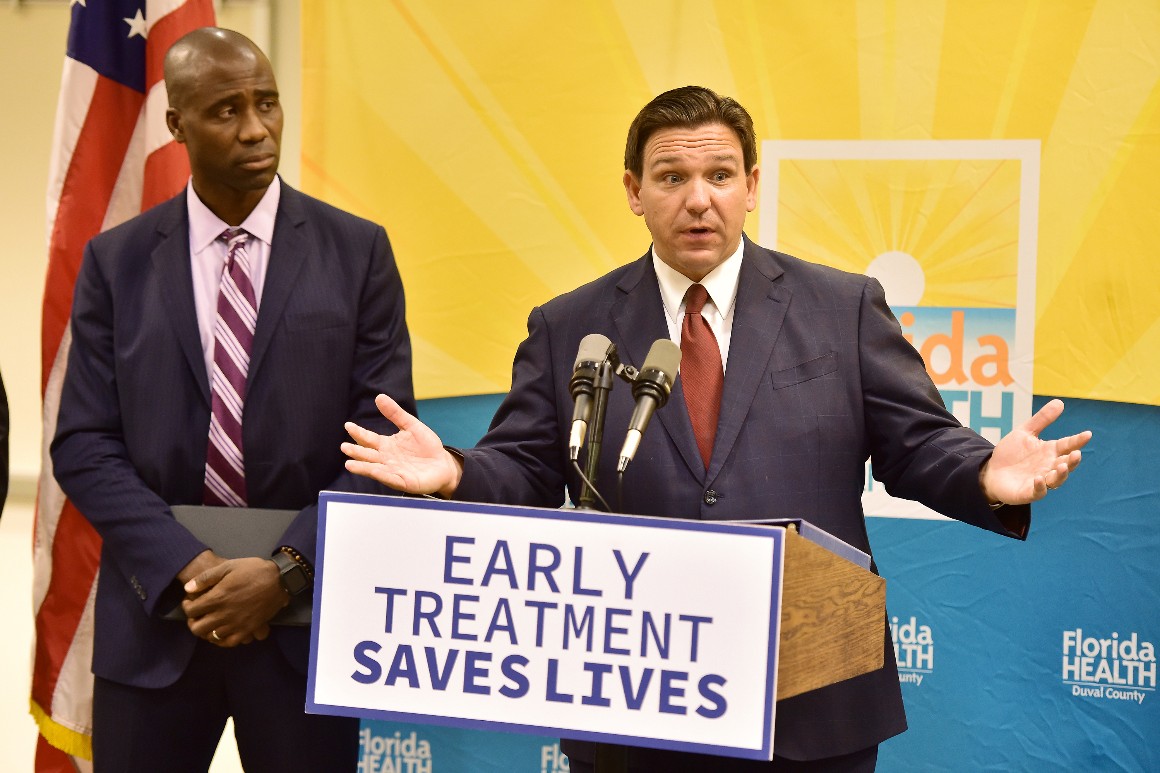
DeSantis this week asked the federal government for more antibody treatments and hammered the White House for not providing promised at-home testing kits. He said on Tuesday that this week Florida is only going to get one-third of the antibody treatments it wants.
“Bogarting these treatments like that and not putting them out is wrong,” said DeSantis, who slammed Biden for failing to meet campaign promises to stop the virus.
DeSantis’s criticism this week is part of balancing act for him and other Republican governors as they navigate an ongoing public health crisis, their future political aspirations and constituents exhausted after facing almost two years of life in a pandemic. While some voters may be indifferent, the elected officials still acknowledge that something must be done to help vulnerable populations.
“Given the clinical profile so far of Omicron, it’s not justifiable to let fear overwhelm you,” DeSantis said, later adding, “They’re just never going to be able to get out of that rut, and it’s just going to continue to hurt a lot of people, and it ain’t going to do anything, you know, to slow down or to stop an incredibly contagious airborne virus.”
One of DeSantis’ most vocal defenders on Twitter about pandemic-related issues is state Rep. Alex Andrade (R-Pensacola), who blasted critics of the governor who he accused of politicizing common-sense health decisions.
“You can acknowledge those simple facts and treat people like adults, while still taking a virus seriously,” Andrade said. “I think the governor has done the best job of that nationally.”
Still, Florida had the third largest rate of new Covid-19 infections in the nation as of last week. The Omicron surge led Florida to surpass its highest infection rate recorded during the Delta surge, which killed thousands as it spread rapidly in Sunbelt states over the summer. But Florida is not seeing the same increase in hospitalizations. Only 10 percent of the roughly 57,000 hospital beds available statewide were occupied as of Monday, which is less than the 28 percent from the height of Delta in August.
While DeSantis and Abbott have minimized the Omicron surge, several GOP governors, including the Texas governor, have pressed their residents to get vaccinated and have publicized their decision to get a booster shot. (DeSantis has not made it clear if he has gotten one and his press office has called it a personal medical decision.)
Georgia Gov. Brian Kemp, who is facing challengers from both parties ahead of his 2022 reelection, made it clear he supports vaccines while at the same time opposing mandates: “I believe it’s time to trust our citizens to do what is right for themselves and for families,” he said during a press conference last week.
Kemp has also responded to the surge in new cases by spending millions to put additional health care workers on the job and by asking the Georgia National Guard to help hospitals and staff testing sites.
Georgia state Sen. Jason Anavitarte, a Republican who represents a suburb outside of Atlanta, praised Kemp’s approach.
“At the end of the day, I think it’s all about personal responsibility,” Anavitarte said. “I think that’s what the public wants, that’s what I hear from people all the time.”
But a primary focus for several GOP governors remains access to monoclonal antibody treatments, which are designed to treat someone who has already been infected. After some initial studies suggested they were not effective against Omicron, the federal government suspended the shipment of two types of treatment only to quickly backpedal amid criticism from Republican-led states including Florida.
DeSantis has maintained that the treatment doses are needed because there are still people getting hit with the Delta variant, which ravaged the state during the summer and early fall.
Related posts:
Views: 0
 RSS Feed
RSS Feed

















 January 7th, 2022
January 7th, 2022  Awake Goy
Awake Goy  Posted in
Posted in  Tags:
Tags: 
















